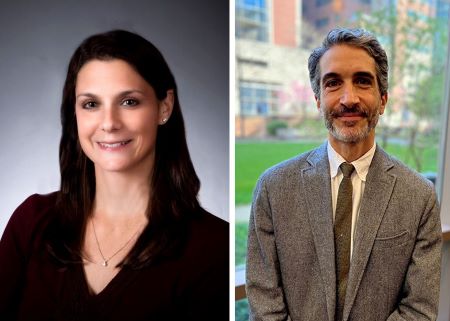UMSON Names New Co-Directors of Research Centers
New co-directors have been named for the Biology and Behavior Across the Lifespan Organized Research Center and the Center for Health Equity and Outcomes Research.

Baltimore, Md. – The University of Maryland School of Nursing (UMSON) has appointed Nicole “Jennifer” J. Klinedinst, PhD, MPH, RN, FAHA, associate professor, as the co-director of the Biology and Behavior Across the Lifespan (BBAL) Organized Research Center and Michael Lepore, PhD, professor, as co-director of the Center for Health Equity and Outcomes Research (CHEOR). Both BBAL and CHEOR are among UMSON’s research Centers of Excellence.
The centers’ extramurally funded investigators study a variety of critical health problems, including chronic pain, impulsivity and drug abuse, neuromuscular disorders, sleep, web-based interventions, health care organizational issues, and bone health. The centers provide critical grounds for developing synergies between researchers and facilitate collaboration and transfer of expertise between more seasoned researchers and those with less experience. They also offer research-related training opportunities, inform members about each other’s research, and provide resources to support researchers with frequent updates about research best practices, grant opportunities, and changes in policies and procedures for grant applications. Membership in the centers is open to faculty, staff, postdoctoral fellows, and students. The center co-directors provide critical and frequent input that determines strategic goals, priorities in hiring research-intensive faculty, focus of internal funding opportunities, evaluation of grant proposals, and collaboration with the University of Maryland Medical System, among others.
Klinedinst, a member of BBAL since its inception in 2011, will serve alongside co-director Barbara Resnick, PhD, RN, CRNP, FAAN, FAANP, University of Maryland, Baltimore Distinguished Professor; UMSON professor; and Sonya Ziporkin Gershowitz Chair in Gerontology. BBAL investigates the management of disease, the optimization of health, and the ways in which biological findings can influence disease prevalence and progression. As co-director, Klinedinst will help coordinate speakers of interest to the group, review and award research facilitation grants, and keep BBAL members abreast of changes to research policy and upcoming grant calls for proposals. In addition, she will provide feedback on abstracts, grants, or papers to center members.
Klinedinst has been a research-intensive faculty member at UMSON since 2011. As an associate professor, she studies how various omics (genetics, genomics, inflammatory markers, bioenergetics, proteomics, and the microbiome) and psychosocial variables influence symptoms such as pain, fatigue, resilience or depression, and health outcomes such as sepsis in adults with chronic disease. She is currently working on the interdisciplinary study “Genomics, Microbiomics, and Bioenergetics Based Personalized Treatment for Trauma Patients at Risk for Sepsis,” funded by the Department of Defense. This study seeks to identify patients with severe traumatic brain injury who are at most risk for developing organ failure or sepsis with the goal of early initiation of personalized preventative measures and treatments. In addition, her non-omics-based research examines bringing meaningful activity to cognitively impaired residents in assisted living settings through personalized volunteer activities. In UMSON’s PhD program, she teaches Nursing Theory and Research Design, mentors PhD students, and has served as chair of the PhD Curriculum Committee.
Lepore will serve alongside CHEOR co-director Yolanda Ogbolu, PhD, CRNP-Neonatal, FNAP, FAAN, associate professor and chair of the Department of Partnerships, Professional Education, and Practice. CHEOR aims to improve health outcomes and eliminate health inequities by generating knowledge about complex causal influences that affect them; by addressing institutional systems and structures that impede health equity and outcomes, including racism and social determinants of health; and by creating social impact through changes in policy and in clinical and community practice. As co-director, Lepore will encourage diversity, equity, and inclusion in the culture and practice of research; help coordinate interdisciplinary and multiprincipal investigator research proposals, center proposals, and training grants; and help evaluate preproposals. In addition, he will advance CHEOR’s infrastructure development and communications with stakeholders and provide members with direct research engagement opportunities in the field of geriatrics and dementia care.
Lepore joined UMSON earlier this year with over 20 years of experience in long-term care and dementia care research and capacity development. Building on his hands-on care work experience, PhD education in sociology, and postdoctoral work in health services research, Lepore’s scholarship emphasizes the value of care work, including the impacts of care work practices on clinical outcomes and of health and social policy — such as minimum wage law — on the value of care work. His research addresses long-term care policy and practice in the United States and internationally, with work funded by a mix of philanthropic foundations and government agencies.
“The new directors are experienced researchers who will foster collaboration and inspire fledgling researchers,” said Erika Friedmann, PhD, professor and associate dean for research “Their expertise complements that of their respective co-directors. Klinedinst and Lepore have a history of collaborating with other disciplines. I expect they will bring their positive energy and drive to enhance opportunities for UMSON researchers.”
# # #
The University of Maryland School of Nursing, founded in 1889, is one of the oldest and largest nursing schools in the nation and is ranked among the top nursing schools nationwide. Enrolling more than 2,100 students in its baccalaureate, master’s, and doctoral programs, the School develops leaders who shape the profession of nursing and impact the health care environment.